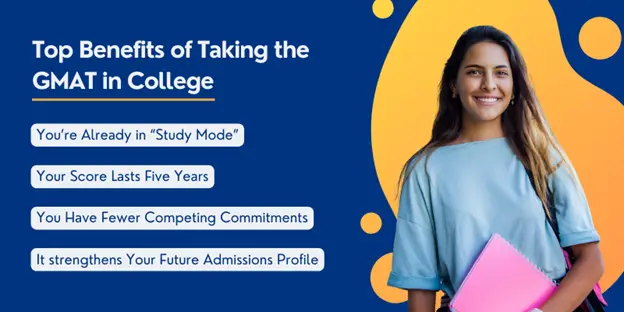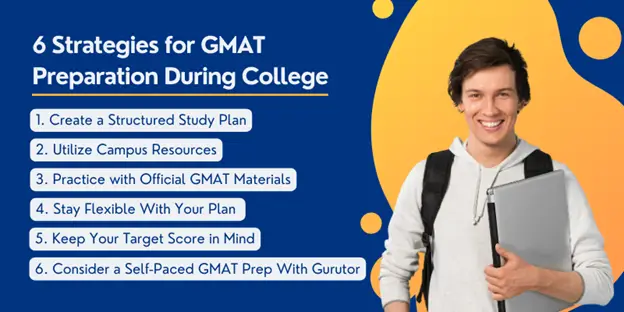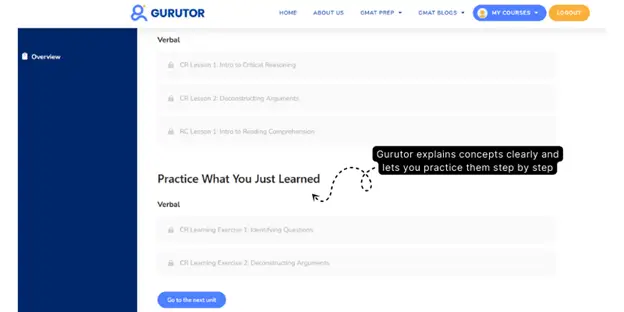Should I Take the GMAT While in College?

Most students wait until they’re just a year away from applying to business school before tackling the GMAT.
But here’s the thing: your GMAT score is valid for five years. That means you don’t have to wait, you can take the test now, while you’re still in college.
So if you’ve been asking yourself, Should I take the GMAT while in college? The answer might be yes.
Why? Because right now, your test-taking muscles are at their sharpest.
Your brain is used to learning, you’re still sharp on math, and your schedule, while busy, has fewer work responsibilities than post-grad life.
On top of that, knowing your GMAT score early gives you a major advantage. You can plan your career steps with a clear picture of which MBA programs you’ll be competitive for.
In this guide, we’ll break down the real advantages and drawbacks of taking the GMAT early, and then show you how to prep strategically if you do decide to sit for it.
Why Taking the GMAT in College Can Be Advantageous
For many students, testing in college comes with built-in advantages that can make the process less stressful and more strategic.

Thus, understanding the benefits of the early GMAT test can help you decide if taking it before graduation is the right move.
Here’s why:
1. You’re Already in “Study Mode”
As a college student, you’re used to giving exams, learning new material, and staying on a regular study schedule.
That momentum carries directly into GMAT prep. Think of it as just one more class, you already know how to block out time, focus, and stay disciplined.
The habits you’ve built now will make the test easier to tackle than if you wait until later.
2. Your Score Lasts Five Years
GMAT scores are valid for five years.
That means a score you earn as a junior or senior can still be used long after you’ve graduated and gained work experience.
You don’t need to have your MBA timeline set in stone, testing now gives you flexibility and options when you’re ready to apply.
3. You Have Fewer Competing Commitments
Compared to life after college, your schedule is more flexible.
Once you start working full-time, balancing a 9-to-5 job, career deadlines, and personal responsibilities makes carving out study hours much harder.
In college, you can dedicate time to GMAT prep around classes and activities, rather than squeezing it into an already packed professional schedule.
4. It strengthens Your Future Admissions Profile
If you lock in a strong GMAT score now, you won’t have to worry about it later.
That frees you up after graduation to focus on the parts of your MBA application that really shine with time, like leadership roles, work achievements, and extracurricular impact.
Thus, having the test behind you lets you build your resume without the added pressure of studying on the side.
The GMAT for undergraduates can feel intimidating at first, but taking it early, whether you’re set on business school or still exploring, can give you a strong head start.
Potential Drawbacks of Taking the GMAT in College
Of course, testing early isn’t the right move for everyone. Before you dive in, it’s important to weigh the challenges:
1. Academic Pressure
Be honest with yourself: do you realistically have the bandwidth?
College life is already packed with classes, projects, exams, a part-time job, and extracurriculars.
Adding GMAT prep can feel like adding another course to your already packed schedule. If you’re already stretched thin, trying to squeeze in GMAT study could risk burnout or hurt your GPA.
2. Lack of Real-World Experience
Most MBA programs expect applicants to have at least 2–3 years of professional experience.
If you take the GMAT too early, say freshman or sophomore year, your score might expire before you’ve worked long enough to apply.
So while the test itself can be done early, your actual application will be stronger once you’ve built career experience.
3. Uncertainty about career goals
Prepping for the GMAT takes time and energy. If you’re not yet sure whether business school is in your five-year plan, you risk investing effort you might not need.
Also, if you’re still exploring career paths, waiting until your goals are clearer could be the smarter move.
Given these challenges, if you’re already maxed out, unsure about business school, or taking the exam so early that your score might expire, it may be better to hold off.
Strategies for Effective GMAT Preparation During College
If you decide that taking the GMAT in college is right for you, a strong plan is key.

Here are the strategies that can help you make the most of your prep time without getting overwhelmed:
1. Create a Structured Study Plan
Decide on a realistic timeline and break your prep into manageable chunks. Many students succeed within 3–6 months of study, depending on workload.
For example, if you’re balancing a full course load, a six-month schedule may be best; if your semester is lighter, a 3–4 month sprint could work.
Also, aim for 8–12 study hours per week and treat these sessions like a class, schedule them on your calendar, and track your progress.
2. Utilize Campus Resources
Your college offers a support system you won’t have after graduation.
Form study groups, attend tutoring sessions, and use the library for distraction-free practice.
Also, connect with professors in business to help gain clarity around specific topics, especially the Quant section.
Even informal resources, like quizzing each other in a dorm study group, can keep prep engaging and effective.
3. Practice with Official GMAT Materials
The GMAT Focus Edition has its own format, so practice with official materials is non-negotiable.
Use the Official GMAT™ Guide, practice exams from mba.com, and question banks that mirror the real test.
For this, take timed practice tests to build stamina, then review mistakes carefully to understand patterns and weaknesses.
4. Stay Flexible With Your Plan
College life can be unpredictable; midterms, projects, or internships may shift your schedule.
If you fall behind, adjust rather than panic. Lighten your GMAT study load during busy weeks and use breaks for more focused practice.
5. Keep Your Target Score in Mind
Know the score range you’ll need for your desired programs. Aiming for top-20 MBA programs might mean targeting a 700+, while specialized master’s programs may require less.
That said, having clear score goals prevents wasted effort and helps you measure whether you’re on track or need to adjust.
6. Consider a Self-Paced GMAT Prep With Gurutor
If you want more structure and guidance while prepping for the GMAT in college, a self-paced system like Gurutor can make a big difference.
Designed to mimic a personal tutor, it helps you stay on track without feeling overwhelmed.
Here’s how it supports your preparation:
- Step-by-Step Guidance: Breaks down each topic into manageable lessons so you can focus on one concept at a time.
- Real-Time Feedback: Shows exactly where you went wrong on practice questions and explains how to fix mistakes.
- Curated Practice Paths: Combines official GMAT questions with targeted drills to ensure you focus on high-impact areas.
- Progress Tracking: Lets you monitor your strengths and weaknesses, so you know which areas need more attention.
- Flexible, Self-Paced Format: Study anytime, anywhere, adjusting your pace to fit around classes, exams, and extracurriculars.

Using a system like this means you’re not just doing endless practice for the sake of it, you’re studying smarter.
Conclusion
Taking the GMAT while you’re still in college can be a smart move, but it really depends on your situation.
If you’re asking yourself, Should I take the GMAT while in college?, consider both the benefits and the challenges.
On the plus side, your academic skills are fresh, your brain is used to learning, and you have time to study without the full-time job and career responsibilities that come later.
Plus, your score will be ready whenever you’re ready to apply.
That said, college comes with its own demands. Balancing GMAT prep with classes, projects, and exams can be challenging, and most MBA programs expect some professional experience.
There’s no one-size-fits-all answer, so ask yourself:
- Are your career goals clear?
- Can you commit the time and energy to study now?
- Are you aiming for programs that accept fresh graduates, like pre-experience master’s, or full-time MBAs after a few years of work?
To prep in college, stick to a well-designed GMAT study plan for students and leverage every resource at your disposal.
Gurutor, for example, offers a structured, self-paced GMAT system that guides you step by step. It focuses on precision over volume, helping you understand mistakes, strengthen weak areas, and combine official GMAT questions with targeted practice drills.
And remember, resources like Gurutor, MBA.com’s official materials are there to help you succeed.
Ready to boost your GMAT score before graduation?
Don’t wait until the pressure is on. Start your GMAT prep today and get ahead.
With a structured, self-paced system like Gurutor, you can study efficiently, track your progress, and master the concepts that matter most.
